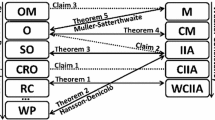Abstract
The standard analysis of procedures (mechanisms), in the theory of implementation, focuses on the properties of the subset of possible outcomes. But since a given procedure may yield very different outcomes in different circumstances (preference profile, information or rationality of players), it may be useful to rely on fine-grained social preferences over outcomes in order to evaluate the procedure. This paper introduces the notion of cross-profile social ordering, and illustrates how this concept may be used for the assessment of procedures.
Similar content being viewed by others
References
Arrow KJ (1951) Social choice and individual values. Wiley, New York
Brams SJ, Taylor AD (1999) The Win-Win Solution. Norton, New York
Crawford VP (1979) A procedure for generating Pareto-efficient egalitarian-equivalent allocations. Econometrica 47: 49–60
Demange G (1984) Implementing efficient egalitarian equivalent allocations. Econometrica 52: 1167–1177
Dhillon A, Mertens JF (1999) Relative utilitarianism. Econometrica 67: 471–498
Fleurbaey M (2005) The Pazner–Schmeidler social ordering: a defense. Rev Econ Des 9: 145–166
Fleurbaey M, Maniquet F (2008) Utilitarianism versus fairness in welfare economics. In: Fleurbaey M, Salles M, Weymark JA (eds) Justice, political liberalism and utilitarianism: themes from Harsanyi and Rawls. Cambridge University Press, Cambridge
Fleurbaey M, Maniquet F (2008) Fair social orderings. Econ Theory 34: 25–45
Gibbard A (1973) Manipulation of voting schemes: a general result. Econometrica 41: 587–601
Hansson B (1973) The independence condition in the theory of social choice. Theory Decis 4: 25–49
Kaneko M, Nakamura K (1979) The Nash social welfare function. Econometrica 47: 423–435
Kolm SC (1972) Justice et équité. Ed. du CNRS, Paris
Pazner E (1979) Equity, nonfeasible alternatives and social choice: a reconsideration of the concept of social welfare. In: Laffont JJ (eds) Aggregation and revelation of preferences. North-Holland, Amsterdam
Pazner E, Schmeidler D (1978) Egalitarian equivalent allocations: a new concept of economic equity. Quart J Econ 92: 671–687
Satterthwaite MA (1975) Strategy-proofness and arrow’s conditions: existence and correspondence theorems for voting procedures and social welfare functions. J Econ Theory 10: 187–217
Sen AK (1999) The possibility of social choice. Am Econ Rev 89: 349–378
Steinhaus H (1948) The problem of fair division. Econometrica 16: 101–104
Thomson W (1996) Concepts of implementation. Jap Econ Rev 47: 133–143
Author information
Authors and Affiliations
Corresponding author
Additional information
This paper has benefited from comments by two anonymous referees, as well as F. Maniquet, H. Moulin, K. Tadenuma, W. Thomson, and reactions of the audience at the conference in honor of Maurice Salles in Caen.
Rights and permissions
About this article
Cite this article
Fleurbaey, M. Social preferences for the evaluation of procedures. Soc Choice Welf 39, 599–614 (2012). https://doi.org/10.1007/s00355-011-0641-3
Received:
Accepted:
Published:
Issue Date:
DOI: https://doi.org/10.1007/s00355-011-0641-3




